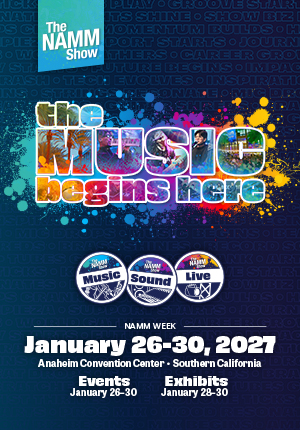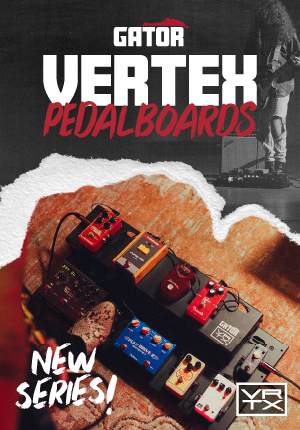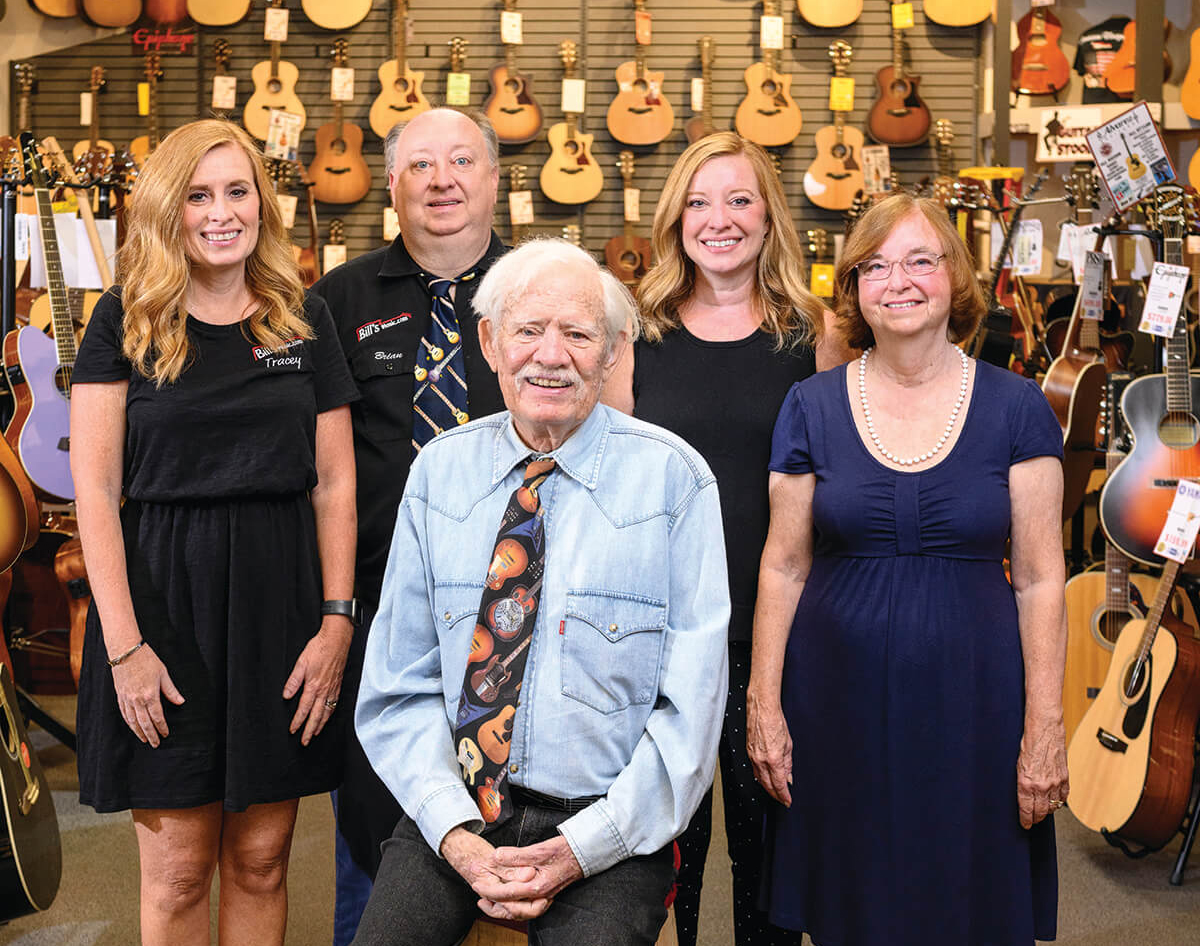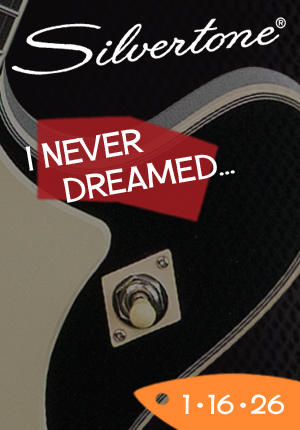
JHS Pedals President Josh Scott
The Details
HQ: Kansas City, Missouri
Founded: 2008
Employees: 29
JHS Show YouTube Subscribers: 254,000+
Fun Fact: If he wasn’t in the music business, Josh would have used his love of history to become a teacher.
How do you start your day?
It depends on the day. It’s typically research and things for The JHS Show [on YouTube], episode-type material and combing through interviews. We do a lot of traveling and interviewing people. So [I’m] working in that research mode in the mornings. Some of that can be going through transcripts and writing scripts and pulling out stories and or interviewing somebody for the show.
Do you then transition over to building pedals later in the day? How does that balance work now?
The balance is not quite 50/50, and it’s not linear. Meaning some days all I do is [work on the] show. There’s actually some weeks where all I’ll do is the show. It’s kind of all over the place. It’s scheduled out, according to our tasks, how far ahead we are traveling someplace. Take today, for instance. I have been working on show stuff since about 7 a.m., and then this interview and JHS pedal stuff in between. I have meetings and things throughout the day, and then I’ll work on the show more in the evening. I think this year as a whole has been a lot more show work.
It seems like the show has especially taken off recently. How did the idea for a fully-fledged show come to be?
I have never been a huge fan of demoing my pedals. It makes me feel a little bit like a used car salesman. It’s hard to talk about your stuff because you’re going to say, “My system sounds great. You should buy it.” That’s not how I approach things. I want a product to speak for itself. So I had always been immersed and obsessed with history of some sort. And then, basically, we just had the circumstance where I had moved [Nick Loux] from being a builder to being a full-time marketing video producer to work on YouTube, Instagram and stuff.
We wanted to do it like it should be done. A lot of people toss up demos. That’s not how YouTube is meant to work. So I was doing a lot of guitar history, guitar teaching and all these experiments, I was doing a lot of public talking and classroom stuff on the history of electronics. And we just started talking about those topics [on the channel]. If you watch the first 15, 20 episodes, we’re just hanging out here and have something more casual. We saw that people were enjoying it to our surprise, and we just morphed into a TV show.
On the show, you feature and talk about other pedal companies, something other brands might shy away from. Why do you talk about your competition?
The short and cliche answer might be that when the industry does well, we’re going to do well. When the tide rises, all ships rise. We’re just doing what we want to do. I wholeheartedly believe that if our pedals aren’t selling, it is not the fault of a competitor. It’s because our pedals aren’t good, or we have horrible service.
It’s about finding out what do I want to do every day. A big part of that is that I love other people’s stories and being a storyteller. A lot of those stories and a lot of that history is right in front of us. The more I’ve traveled and tried to dig these stories out from the ’60 and ’50s and ’70s, [I meet] people who invented some of these pedals and can’t remember what they did. And that’s the most frustrating part of what I’ve been doing for a few years. I want to keep that from happening by telling these stories.
You mentioned having somebody working on the show full time. For a brand that’s looking to start doing something similar, What piece of advice would you offer?
Do what you love doing. It is hard. An episode a week for over two years takes a lot of work. [We have] a staff of four people who are separate from the pedal company working on the show. So it’s become a whole other thing. So you have to do what excites you. If you do it to jump in on a trend, I don’t think it would work because it would be so exhausting.
Can you tell me a little bit more about the idea of building the all-white JHS 3 series budget pedals and what really got you inspired to do it? Most boutique builders don’t look to be budget-friendly.
I know even defining them as a budget [series] is hard for some people. Some people think budget should mean $30, not $100, but for me, if we can make an American-made pedal and have our hands on every part of it, at the lowest price possible? It’s budget. We were like, for this to work, we have to sell a lot of them. I think we also just wanted to rebel a little bit against an era [of pedal construction] that’s becoming more complicated.
And I love all [the complicated, digital] stuff, but for us, it became what can we offer that goes the other way? That was the goal. It was what’s the market doing? How can we swing the other way and do something that’ll last? And we want it to be good enough to span for decades. We’ll see how that plays out.
Do you believe that the pedal industry is a bubble waiting to burst, as some people speculate? What do you think the future of the industry will look like?
I don’t think it’s as simple as some people have stated it about pedals. I’ve seen the people’s comments saying that the pedal bubble is going to burst. It’s pretty nuanced, but I think it comes down to fewer companies are going to be successful. The market’s going to go back to something like in the ’80s, when there wasn’t a single guitar player concerned with what type of switching was in their pedal as a true bypass. And companies were selling millions of pedals. I think we’re headed back there. I think that the companies [that] are hung up on those unrealistic expectations of what a pedal should be are going to have a hard time. It’s coming full circle in a weird way. How did you get into making pedals?
This story starts back in 2007. I was doing studio and live touring work at the time, and I had a broken Boss BD-2 Blues Driver pedal. It had a broken foot switch, nothing crazy. All I had to do was replace the contact switch inside, and I fixed it. But in opening up the pedal, seeing all the wires and components inside of it, I got super-interested. Specifically, I wanted to know why my two versions of the same Blues Driver circuit —my Keeley modded Boss BD-2 and the original Boss BD-2 pedal — sounded so different. I liked them both a lot. I loved the unmodified Boss BD-2, but I loved Robert Keeley’s modded version as well. I would stack them with each other, and I took both units apart, examining them piece by piece, seeing how they compared.
It was a major learning curve for me; I’d be looking at a capacitor, which I didn’t know was a capacitor at the time, and I say, “Oh, there’s a number on it. What is this thing?” I’d use a search engine and figure it out, “Oh, this is a capacitor. These numbers mean something.” And I took out a notepad and I cross-referenced both circuits for fun.
Did you have any technical education or background when you started out making pedals?
I have a high school diploma with Ds and Cs, mostly. I was not a great student. Of course, I understand now why it was always really frustrating. I don’t learn that way. So, no, I have no technical education. I got into pedal building because I loved it. It’s the same way with a lot of people who start their own business. They get into a certain field because it’s fun and they’re interested, and although at the start they might not know technically what they’re doing, they’re motivated to learn. If they love it, if they invest time in it and work hard, they can figure it out. That’s what I did, and I’m still learning. As the years have gone by, people like Robert Keeley and Brian Wampler have taught me a lot. In fact, we teach each other. Sometimes I’ll discover something and share it with them. It’s a constant education. One of my favorite quotes is from Albert Einstein: “I believe that love is a better teacher than a sense of duty, at least for me.” I think it explains how I think about this. My education — about 13 years of experience so far — is pretty evenly split between amazing successes and horrible mistakes.
How did you approach music stores with your pedals at first? At what point did you feel confident?
The company started out as JHS Mods, with no real intention of building our own pedals, but around 2008 I actually started labeling these prototypes with JHS Pedals stickers. When I made that choice, it’s just like a switch flipped in my head. I did not care if people didn’t like them, I was just going to try to sell them. I went to guitar shops with a little crappy pedal board of stamped pedals that didn’t make a lot of sense. My initial pedals were a mess, with these knobs labeled with letters instead of words. Asking a store to carry that at the time was almost suicidal.
I just went and did it anyway, which is hopefully a huge encouragement for a lot of you out there. If you build a pedal, if you take it to a guitar shop and ask them to buy it, the worst thing that’ll happen is it won’t work out. Who cares? At least you tried. Nine times out of ten, if you keep on trying, something will work out.
If you could go back in time to when you first started JHS, what would you do differently?
I would only do one thing differently: I would get ventilation fans for my soldering iron immediately after purchasing it, so that the incident around 2009 when I was soldering and blood started coming on my nose and I had to go to the emergency room would disappear from the timeline. Also, I’d keep better financial records and pay taxes faster.











